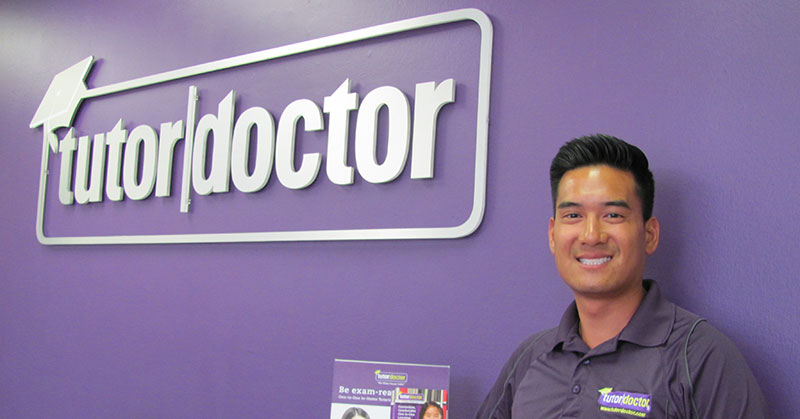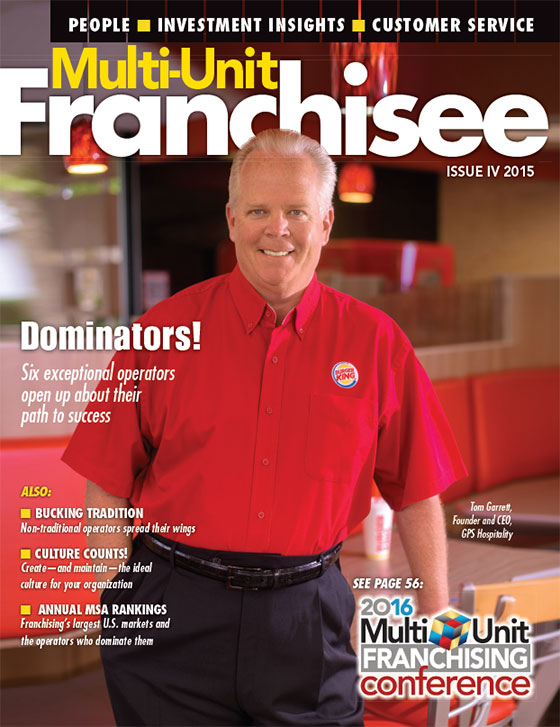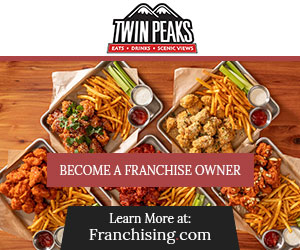Tutoring Ninja: Jon-Anthony Lui is Passionate About Making a Difference

When Jon-Anthony Lui was growing up, he watched closely as his father achieved success in franchising, selling products such as real estate and insurance. But the bright young entrepreneur found his niche when he began working for Tutor Doctor, which offers one-on-one tutoring to children in the home.
"Making a difference with young ones has always been a passion of mine. We all remember who made an impact on our lives at some point--a teacher, friend, relative, or mentor--and I liked the idea of capturing that magic and releasing it upon the masses in an organized, structured way. That's a beautiful thing," says Lui, who owns 10 Tutor Doctors, whose 350 tutors serve 850 families in 10 territories in Greater Toronto.
Lui, whose parents died when he was 21, opened his first franchise territory, Tutor Doctor Vaughan, in 2009. In 2013, he became the brand's first franchisee to reach $1 million in sales. In 2014 Lui, the brand's largest franchisee, was named Franchisee of the Year.
His path to success began with five years at an e-learning company, selling design and development services for online training. "I saw that in a face-to-face meeting with people, I could make an impression and be effective. I experienced the same thing with public speaking, starting when I was seven through my church congregation. Over time, I developed a love of that and teaching others. In that sense, I thought being an entrepreneur would leverage and improve those skills," he says.
He also was attracted to franchising. "I liked the idea of having a business that allowed you to work on it rather than in it," says Lui, who earned his diploma in marketing from Seneca College of Applied Arts and Technology in Toronto. "I love the strategy of it. It's like playing chess: you always have to think a couple of moves ahead."
After leaving the e-learning company, Lui contacted a former colleague of his late father, who offered him a job managing a Tutor Doctor unit for him. "It was a new territory, so I started from scratch and bought it from him six months later," says Lui, adding that he saw Tutor Doctor as having low risk and high potential.
In contrast to tutoring models that were primarily brick-and-mortar centers with a group learning environment, brands such as Tutor Doctor, which was founded in 2000 and began franchising in 2003, struck a chord with parents who wanted one-on-one tutoring for their children at home, says Lui. Tutor Doctor, he says, has grown into the fastest-growing in-home private tutoring franchise and is set to surpass $102.8 billion in sales by 2018.
His wife Clarissa, who also has an entrepreneurial bent and had opened her own business making custom suits for women, was behind him 100 percent. "She was extremely supportive. We both had the desire to create something," he says. "She was enjoying her work, but she saw me struggling with paperwork and helped me out. Since I needed more and more help as we grew, we figured we'd focus on this together."
The division of duties fell along the lines of their training and abilities: Clarissa worked in administration on the back end, and her husband focused on the front end, dealing with customer service and marketing. "That was our agreement and we learned to work together pretty well," he says.
"Living in the same house, working across the desk from each other, couples are bound to have challenges, but we set boundaries about work and schedule when to talk about it. It's highly regimented, but what we had to do to attain the lifestyle we want. On a Saturday, unless it's an emergency, we don't talk about work. We save it for Monday when we have a staff meeting." As Jehovah's Witnesses, the couple spend their time off volunteering in the community, leading Bible studies, and going door to door to talk about their church, he says.
Lui's best advice for potential franchisees? "Many people have told me not to worry so much, to just take things one day at a time," he says. "I'd also add: Don't be afraid to ask for help."
Doing just that has led Lui to where he is today. When he decided to become an entrepreneur, he took his late father's address book and called everybody in it. "I started by introducing myself as Mario Lui's son and wondered if they had a minute to talk to me about my father and how they knew him." That strategy eventually led him to that Tutor Doctor job.
In addition to maintaining a strong marriage and a profitable business, Lui says he finds Tutor Doctor's contributions to improving the lives of students and their parents to be most rewarding. "When a family knows someone is helping them address their child's needs, it reduces stress and gives them more time to focus on being a family. That's what it's all about."
Name: Jon-Anthony Lui
Title: Owner, with wife Clarissa
Company: Tutor Doctor Vaughan
No. of units: Tutor Doctor, 10
Age: 30
Family: Married to Clarissa Lui
Years in franchising: 6
Years in current position: 6
Personal
First job:
McDonald's when I was 14 years old.
Formative influences/events:
My father was always involved in franchising. He worked with Century 21, Prudential, and WSI. This was definitely a career influence. Also, both parents passed away when I was 21. It was a difficult time in my life, a time in which I had to grow up fast.
Key accomplishments:
Being the first (and still the only) Tutor Doctor franchisee to reach $1 million in sales (2013), being named 2014 Franchisee of the Year, and winning an award every year I have been in business.
Biggest current challenge:
Optimizing the business, trying to be more efficient. Marketing is always an ongoing challenge as we try to find cost-effective ways to market ourselves and our brand. And I continue to develop myself as a leader.
Next big goal:
Achieving greater profitability.
First turning point in your career:
When I realized that I wanted to be an entrepreneur. This was always something on my mind, but actually making the decision was huge. Buying the franchise turned the distant thought into a reality.
Best business decision:
Having the right person in the right seat, having an A team supporting my business.
Hardest lesson learned:
Learning that you have to take care of the business so that you can take care of others.
Work week:
I work full-time and am always in the office Monday through Thursday.
Exercise/workout:
I work out (weight training) three times a week.
Best advice you ever got:
Many people have told me to stop worrying, to take one day at a time.
What's your passion in business?
Building something significant that has an impact on people.
How do you balance life and work?
I compartmentalize. It comes down to a schedule. At work, I am working. When I'm not at work, I try not to work. One way we enjoy making our down time count is by volunteering. We're Jehovah's Witnesses and we're involved in teaching others about the Bible.
Guilty pleasure:
Eating. I love Korean food. (I'm not Korean. My parents were originally from Hong Kong, and I also have some Portuguese in my background.)
Favorite book:
I'm not a big reader. I prefer to interact and talk to people, including a number of informal mentors.
Favorite movie:
I'm not the biggest movie buff.
What do most people not know about you?
That I love to cook!
Pet peeve:
People who are rude or insensitive, and being rushed.
What did you want to be when you grew up?
A ninja.
Last vacation:
Mexico on a company vacation with top performers in the system.
Person I'd most like to have lunch with:
My wife. We've been married for 7 years.
Management
Business philosophy:
It's all about execution. You have to get out there and make things happen. You can't sit around and wait for results. You have to go out and create.
Management method or style:
I try to be very organized and I'm very analytical, digging deep into the numbers. I have dashboards telling me key analytics on a weekly basis. All the team members know their KPI and they report in on a weekly basis whether they have achieved it. Coaching comes in one-on-one status meetings with team members to see what's working well and what needs to be improved, or what support needs to be provided.
Greatest challenge:
Attaining growth and profitability at the same time. People say if you're growing you're not profitable, and if you're profitable you're not growing. I want to do both.
How do others describe you?
At a conference, one person called me a "tutor ninja," which was funny because when I was a kid I wanted to be a ninja, doing back flips and throwing ninja stars. I think most people find me humble and modest.
One thing I'm looking to do better:
To choose one thing to be better at and really honing in on that. Right now I'm focusing on leadership. And being less impatient.
How I give my team room to innovate and experiment:
Delegating is extremely important. So is building a culture that encourages creativity all the time.
How close are you to operations?
Close. I have meetings to discuss strategy and keep things moving forward. However, the operational team really has a lot of control and ownership.
What are the two most important things you rely on from your franchisor?
Support (training, systems, beta) and resources (technology).
What I need from vendors:
We need partners, people who understand what we're trying to do.
Have you changed your marketing strategy in response to the economy? How?
Marketing has always been an important part of the budget, regardless of the economy.
How is social media affecting your business?
It's not something that can really be quantified; still in the early phase.
How do you hire and fire?
Hire slow, fire fast. In hiring, I take my time and ask out-of-the-box questions. We're always recruiting and we set expectations from the beginning.
How do you train and retain?
The training program has to be specific to each person's role. Performance has to be tied to KPI; it cannot be subjective. And retention starts with building a culture where people want to work, creating a second family, and helping them see they are part of making a difference.
How do you deal with problem employees?
Communicate with them; try to see what is going on. Having things laid out crystal clear in the beginning provides you with a point of reference to help guide the conversation, identify the gap, and correct it.
Fastest way into my doghouse: Not doing your job and clashing with the company culture.
Bottom Line
Annual revenue:
$1.5 million last year.
2015 goals:
$2.2 million in sales.
Growth meter: How do you measure your growth?
By sales, revenue, profitability, number of tutors, and number of students.
Vision meter: Where do you want to be in 5 years? 10 years?
Being significant--taking over the world! I want a business that runs without me, so I need to keep hiring the right staff to do the job. I don't have any magic number of units in mind, because things can change so quickly. I want to be happy and to feel good about what I'm doing. I want to have a great relationship with my wife, to be profitable, and to be well-respected in the franchisee community and by my team.
How is the economy in your region affecting you, your employees, your customers?
We're not really affected. Because our industry is education, it is always seen as a solution.
Are you experiencing economic growth in your market?
Yes, consistent year-over-year growth. Business booms in the summer.
How do changes in the economy affect the way you do business?
It really doesn't because education is always in demand.
How do you forecast for your business?
By looking at previous years' measurements and conducting comparisons and estimates.
What are the best sources for capital expansion?
Strong sales. This self-funds the business.
Experience with private equity, local banks, national banks, other institutions? Why/why not?
No, not really. We prefer to self-fund.
What are you doing to take care of your employees?
We offer training and coaching, company cars, aligning everyone with the company vision, and are working toward the goal of offering benefits.
How are you handling rising employee costs (payroll, minimum wage, healthcare, etc.)?
It might come down to raising prices, but we take advantage of government funding and continue to grow the top line to avoid any issues.
How do you reward/recognize top-performing employees?
Recognition in front of peers, plaques and awards, team retreats, team-building exercises, professional development, and training and education.
What kind of exit strategy do you have in place?
I want to build a business that appeals to a lot of buyers. I make every decision with this in mind so that when the time comes, there are plenty of options.
Share this Feature
Recommended Reading:
FRANCHISE TOPICS
- Multi-Unit Franchising
- Get Started in Franchising
- Franchise Growth
- Franchise Operations
- Open New Units
- Franchise Leadership
- Franchise Marketing
- Technology
- Franchise Law
- Franchise Awards
- Franchise Rankings
- Franchise Trends
- Franchise Development
- Featured Franchise Stories
FEATURED IN

Multi-Unit Franchisee Magazine: Issue 4, 2015

$550,000
$250,000





 The multi-unit franchise opportunities listed above are not related to or endorsed by Multi-Unit Franchisee or Franchise Update Media Group. We are not engaged in, supporting, or endorsing any specific franchise, business opportunity, company or individual. No statement in this site is to be construed as a recommendation. We encourage prospective franchise buyers to perform extensive due diligence when considering a franchise opportunity.
The multi-unit franchise opportunities listed above are not related to or endorsed by Multi-Unit Franchisee or Franchise Update Media Group. We are not engaged in, supporting, or endorsing any specific franchise, business opportunity, company or individual. No statement in this site is to be construed as a recommendation. We encourage prospective franchise buyers to perform extensive due diligence when considering a franchise opportunity.